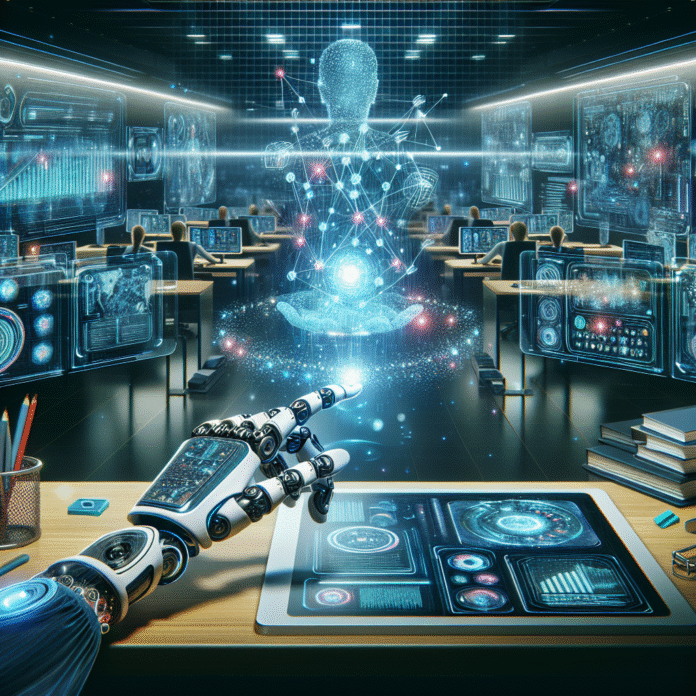In recent years, artificial intelligence (AI) has rapidly moved beyond the realms of automation, evolving to redefine how we work, communicate, and innovate. Traditionally seen as a tool for efficiency and productivity, AI now encompasses a transformative force that reshapes industries and job roles. As we explore this new high-tech frontier, it is essential to understand the multifaceted impact of AI on the future of work.
The Evolution of AI in the Workplace
From Automation to Intelligence
Initially, AI’s primary role in the workplace focused on automating repetitive tasks. Machines could streamline processes in manufacturing, data entry, and logistics. However, today’s AI systems, powered by advanced machine learning and natural language processing, are increasingly enhancing cognitive tasks. This shift is not merely about replacing human labor but augmenting it, allowing employees to focus on higher-value tasks requiring creativity, emotional intelligence, and strategic thinking.
Enhancing Decision-Making
AI is making significant strides in data analysis and decision-making processes. Advanced analytical tools can sift through enormous datasets in real time, uncovering trends and insights that humans might miss. For instance, in sectors like finance, marketing, and operations, AI tools can provide predictive analytics, enabling businesses to make informed decisions swiftly. This capability transforms traditional decision-making paradigms, where data-driven insights become the foundation for strategy.
The Rise of Collaborative AI
Augmented Workforce
Rather than a simple replacement or enhancement of human roles, the future of work appears to be moving toward a hybrid approach, where humans and AI collaborate productively. This concept, often referred to as "collaborative AI," allows teams to leverage AI’s analytical prowess while retaining human qualities such as empathy, ethical reasoning, and contextual understanding.
In sectors like healthcare, for example, AI can assist doctors in diagnosing diseases more accurately and at faster rates. However, the nuanced nature of patient care—requiring human touch and compassion—remains firmly in the hands of healthcare professionals.
New Skill Sets and Training
As AI technologies become commonplace, the demand for new skill sets is growing. Workers will need to adapt by acquiring skills that enable them to work alongside AI orchestrations. The focus will increasingly be on critical thinking, creativity, and problem-solving abilities, distinguishing human workers from machines.
Organizations are also investing in employee training and reskilling programs to bridge this gap. Companies that prioritize such initiatives not only foster a more adaptable workforce but also enhance employee morale and retention rates.
Ethical Considerations and Challenges
Navigating Ethical Dilemmas
The integration of AI into the workplace raises significant ethical considerations. Issues of job displacement are often at the forefront of discussions about automation. While AI can enhance productivity, it can also lead to fears of job loss, especially in lower-skilled roles. Companies and governments must work collaboratively to develop comprehensive policies that address these concerns, ensuring a balanced approach to technological integration.
Diversity in AI Development
Another challenge involves ensuring that AI technologies are developed and implemented equitably. Bias in AI algorithms can lead to discrimination in hiring practices, promotion opportunities, and workplace dynamics. Promoting diversity in AI research and development teams is essential for creating fair and inclusive systems that benefit all employees.
The Future is Collaborative
As we look ahead, one thing is clear: the future of work will not be defined solely by AI as a tool for automation. Instead, it will be characterized by a collaborative relationship between human intelligence and artificial intelligence. Industries will continue to evolve, and the most successful organizations will be those that embrace this partnership, harnessing the strengths of both human workers and AI technologies.
Closing Thoughts
Ultimately, the evolution of AI is not about replacing human jobs but enhancing the work experience and driving innovation. By fostering a culture of collaboration and continuous learning, we can navigate the future of work with optimism and adaptability. Embracing this AI-driven transformation will not only create new opportunities and efficiencies but also lead us into a more dynamic, innovative, and inclusive workforce. As we stand on the brink of this new era, the challenge will be to shape a future where technology serves humanity, fostering growth, creativity, and resilience.






